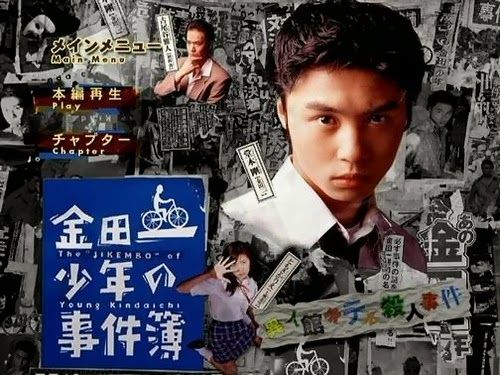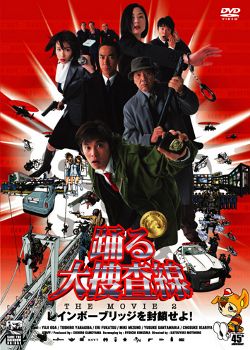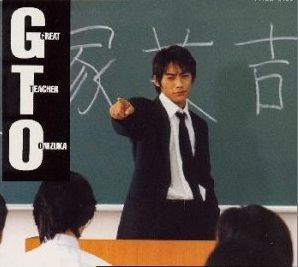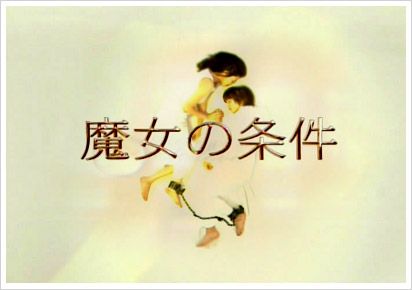1. Furuhata Ninzaburo 1994
This is my all time favorite detective drama. It has spawned 3 seasons and several TV specials from 1994 to 2006. Masakazu Tamura plays the unconventional but intelligent, observant and eloquent detective, Furuhata Ninzaburo. Masahiko Nishimura plays his naive and clumsy sidekick, Shintaro Imaizumi. I like the chemistry between the duo as they solve crimes together. Furuhata's deadpan humor and Shintaro's slapstick humor compliment each other.
In every episode, there is a different crime and a different celebrity makes a guest appearance as the criminal. The celebrities are usually very famous, such as boy band SMAP, comedian Akashiya Sanma, and actress Matsushima Nanako.
"Furuhata Ninzaburo" is different from other detective dramas because it shows the audience who the criminal is and how he (she/they) committed the seemingly flawless crime, right from the start. I am intrigued by how Furuhata manages to find loopholes to solve the 'perfect' crimes, and how he ingeniously traps criminals into making a confession.
2. Kindaichi Shounen No Jikenbo (Case Files of Young Kindaichi) 1995
Kindaichi Hajime (Domoto Tsuyoshi) is a high school student and the grandson of the famous (fictional) private detective, Kindaichi Kosuke. On the surface, he is an easy-going and ordinary student, but in actuality, he is a brilliant detective with an IQ of 180. He solves mysteries together with his childhood sweetheart, Nanase Miyuki (Tomosaka Rie) and Inspector Kenmochi (Furuoya Masato).
Based on a popular comic series, the characters and plot are often over-the-top, but that is what makes "Kindaichi Shounen No Jikenbo" so entertaining to watch. It is a joy watching Kindaichi solve the mysteries, which often have a twist in the end. Other actors such as Matsumoto Jun and Kamenashi Kazuya have played the role of Kindaichi in sequels, but I still prefer the original version by Domoto.
3. Odoru Daisousasen (Bayside Shakedown) 1997
"Odoru Daisousasen" is a police drama which depicts the ups and downs of police officers working on the front-line, at the bottom of the organisation structure. It attempts to expose the bureaucracy of the whole police system in a light-hearted way, a bureaucracy which is inherent in many places in Japan.
Oda Yuji plays Aoshima Shunsaku, a former computer salesman who career switches to be a police detective. He is disappointed when he discovers that the red-tapism and office politics present in the police organisation are not much different from the corporate world. Yanagiba Toshiro plays Muroi Shinji, a high flyer in the police force. Together, Aoshima and Muroi tries to fight the bureaucracy and change the system.
"Odoru Daisousasen" is so popular that it has spawned several TV specials and four movies, from 1997 to 2012. It is a comedy which is thought-provoking at the same time. The idealistic and enthusiastic Aoshima is the 'underdog hero' that ordinary folks like us easily relate to, and want to root for.
4. Great Teacher Onizuka (GTO) 1998
Onizuka Eikichi (Sorimachi Takashi) was a delinquent and graduated from a third-rate university. He is also a high school teacher who has a great passion for teaching and truly cares for his students. Matsushima Nanako plays his love interest, Fuyutsuki Azusa, a teacher who actually wants to be an air-stewardess.
Onizuka often creates trouble for the school because of his unconventional way of doing things. For example, while all the teachers try to dissuade a student from dropping out of school to become a singer, Onizuka encourages her to pursue her dreams. When another student is upset because her parents are not on speaking terms and sleeping in separate bedrooms, he brings an ax to her house and literally breaks the walls between the rooms, so that her parents will start communicating again.
Although the students hate Onizuka at first, they are soon won over by his genuine concern for them. In a particularly touching scene, Onizuka is forced to resign and leave the school. The devastated students protest against it, and the school has to forcefully separate them from Onizuka.
At times funny and at times touching, this is an inspiring drama about a 'great teacher'.
5. Majo No Jouken (Terms of a Witch) 1999
"Majo No Jouken" is about the forbidden love between a 26-years-old high school teacher, Hirose Michi (Matsushima Nanako) and her 17-years-old student, Kurosawa Hikaru (Takizawa Hideaki). Michi has no passion for teaching and only became a teacher because her father is a school principal. She accepts the marriage proposal from her fiance, Kitai Masaru (Bessho Tetsuya), although she is unsure if she loves him.
Hikaru is the heir to a hospital. His father passed away when he was very young, and his mother is overly protective of him. Like Michi, he feels trapped in life and desires freedom, and they connected. While Michi tries to suppress her attraction to Hikaru, he is open about his feelings for her, and tries to get closer to her.
When Michi and Hikaru finally get together, they face a lot of pressure from society and their parents. Hikaru is bullied by his classmates in school. Michi is fired from her job, arrested by the police and forced to see a psychiatrist.
A romantic and touching love story which explores issues such as the need to conform to social norms and school bullying.
In every episode, there is a different crime and a different celebrity makes a guest appearance as the criminal. The celebrities are usually very famous, such as boy band SMAP, comedian Akashiya Sanma, and actress Matsushima Nanako.
"Furuhata Ninzaburo" is different from other detective dramas because it shows the audience who the criminal is and how he (she/they) committed the seemingly flawless crime, right from the start. I am intrigued by how Furuhata manages to find loopholes to solve the 'perfect' crimes, and how he ingeniously traps criminals into making a confession.
2. Kindaichi Shounen No Jikenbo (Case Files of Young Kindaichi) 1995
Kindaichi Hajime (Domoto Tsuyoshi) is a high school student and the grandson of the famous (fictional) private detective, Kindaichi Kosuke. On the surface, he is an easy-going and ordinary student, but in actuality, he is a brilliant detective with an IQ of 180. He solves mysteries together with his childhood sweetheart, Nanase Miyuki (Tomosaka Rie) and Inspector Kenmochi (Furuoya Masato).
Based on a popular comic series, the characters and plot are often over-the-top, but that is what makes "Kindaichi Shounen No Jikenbo" so entertaining to watch. It is a joy watching Kindaichi solve the mysteries, which often have a twist in the end. Other actors such as Matsumoto Jun and Kamenashi Kazuya have played the role of Kindaichi in sequels, but I still prefer the original version by Domoto.
3. Odoru Daisousasen (Bayside Shakedown) 1997
"Odoru Daisousasen" is a police drama which depicts the ups and downs of police officers working on the front-line, at the bottom of the organisation structure. It attempts to expose the bureaucracy of the whole police system in a light-hearted way, a bureaucracy which is inherent in many places in Japan.
Oda Yuji plays Aoshima Shunsaku, a former computer salesman who career switches to be a police detective. He is disappointed when he discovers that the red-tapism and office politics present in the police organisation are not much different from the corporate world. Yanagiba Toshiro plays Muroi Shinji, a high flyer in the police force. Together, Aoshima and Muroi tries to fight the bureaucracy and change the system.
"Odoru Daisousasen" is so popular that it has spawned several TV specials and four movies, from 1997 to 2012. It is a comedy which is thought-provoking at the same time. The idealistic and enthusiastic Aoshima is the 'underdog hero' that ordinary folks like us easily relate to, and want to root for.
4. Great Teacher Onizuka (GTO) 1998
Onizuka Eikichi (Sorimachi Takashi) was a delinquent and graduated from a third-rate university. He is also a high school teacher who has a great passion for teaching and truly cares for his students. Matsushima Nanako plays his love interest, Fuyutsuki Azusa, a teacher who actually wants to be an air-stewardess.
Onizuka often creates trouble for the school because of his unconventional way of doing things. For example, while all the teachers try to dissuade a student from dropping out of school to become a singer, Onizuka encourages her to pursue her dreams. When another student is upset because her parents are not on speaking terms and sleeping in separate bedrooms, he brings an ax to her house and literally breaks the walls between the rooms, so that her parents will start communicating again.
Although the students hate Onizuka at first, they are soon won over by his genuine concern for them. In a particularly touching scene, Onizuka is forced to resign and leave the school. The devastated students protest against it, and the school has to forcefully separate them from Onizuka.
At times funny and at times touching, this is an inspiring drama about a 'great teacher'.
5. Majo No Jouken (Terms of a Witch) 1999
"Majo No Jouken" is about the forbidden love between a 26-years-old high school teacher, Hirose Michi (Matsushima Nanako) and her 17-years-old student, Kurosawa Hikaru (Takizawa Hideaki). Michi has no passion for teaching and only became a teacher because her father is a school principal. She accepts the marriage proposal from her fiance, Kitai Masaru (Bessho Tetsuya), although she is unsure if she loves him.
Hikaru is the heir to a hospital. His father passed away when he was very young, and his mother is overly protective of him. Like Michi, he feels trapped in life and desires freedom, and they connected. While Michi tries to suppress her attraction to Hikaru, he is open about his feelings for her, and tries to get closer to her.
When Michi and Hikaru finally get together, they face a lot of pressure from society and their parents. Hikaru is bullied by his classmates in school. Michi is fired from her job, arrested by the police and forced to see a psychiatrist.
A romantic and touching love story which explores issues such as the need to conform to social norms and school bullying.





These are all mysteriously close to the end of the 1990s, suggesting a difference in age. I think the very best of the ’90s were clearly “Tokyo Love Story”「東京ラブストーリー」(1991), “Asunaro Hakusho (White Paper)”「あすなろ白書」(1993), and “101st Marriage Proposal”「101回目のプロポーズ」(1991).
ReplyDeleteThis comment has been removed by the author.
ReplyDelete